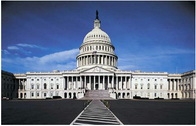Advertisement
NAMB and industry groups back Biggert's proposal for delay in HUD's revised RESPA rule

In an Oct. 14 letter to the U.S. Committee on Financial Services, Reps. Barney Frank and Spencer Bachus, the National Association of Mortgage Brokers (NAMB), along with the American Bankers Association, Consumer Bankers Association, Consumer Mortgage Coalition, Financial Services Roundtable, Housing Policy Council, Mortgage Bankers Association, National Association of Federal Credit Unions and the Real Estate Services Providers Council Inc., have shown their support for an initiative by Rep. Judy Biggert that would stagger the U.S. Department of Housing & Urban Development's (HUD) implementation of its revised Real Estate Settlement Procedures Act (RESPA) rule, set to take effect Jan. 1, 2010.
Full text of the letter to Rep. Frank, Chairman of the Committee on Financial Services, and Rep. Bachus, Ranking member of the Committee on Financial Services is as follows:
Dear Chairman Frank and Ranking member Bachus:
As the Financial Services Committee considers HR 3126, the Consumer Financial Protection Agency (CFPA) Act, the undersigned organizations representing the real estate finance industry urge the committee to adopt an amendment, expected to be offered by Rep. Judy Biggert, that would require the U.S. Department of Housing & Urban Development (HUD) to provide for a more gradual implementation period for its Real Estate Settlement Procedures Act (RESPA) rule.
The RESPA rule is scheduled to take full effect on Jan. 1, 2010--less than three months from now. Despite the best motivations of HUD, and the sincerest efforts of the industry, there are simply too many unresolved issues to allow the industry to be fully RESPA-compliant by the first of the year. HUD’s guidance has come far too late in the process and has been inadequate and often contradictory. Due to unresolved issues and critical unanswered questions, many lenders and settlement service providers are unprepared to comply. This, in turn, will cause very inconsistent implementation and confusion for consumers seeking to purchase a home.
The Biggert amendment would require HUD to postpone the implementation date of its RESPA reform rule for a reasonable amount of time and take several steps to achieve effective implementation. It would also allow both new and old forms to be used during the transition period. And it would require that, going forward, HUD and the Federal Reserve coordinate their regulatory efforts to ensure comparable RESPA and Truth-in-Lending Act (TILA) disclosures.
RESPA reform is important to consumers and the industry. Passage of the Biggert amendment would give all participants the additional time they need to get it right and assure full compliance.
Sincerely,
American Bankers Association
Consumer Bankers Association
Consumer Mortgage Coalition
Financial Services Roundtable
Housing Policy Council
Mortgage Bankers Association
National Association of Federal Credit Unions
National Association of Mortgage Brokers
Real Estate Services Providers Council Inc.
For more information, visit NAMB.org.
About the author





